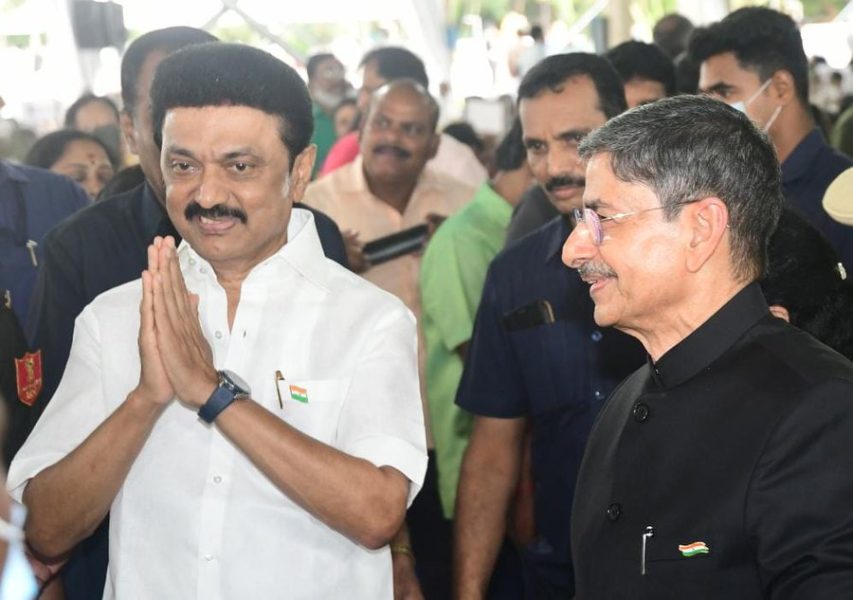
TN varsity V-Cs in a fix as Governor-govt 'appointment war' intensifies
At a time when TN Governor RN Ravi is yet to clear two bills which would pass the power to appoint V-Cs to state universities, from his hand to the state government, VCs feel the transition period will affect the functioning of state universities

The cold war between the Tamil Nadu government and Governor RN Ravi over having the final say on the appointment of vice chancellors to state universities, has left V-Cs in a quandary as the latter feel they would be caught up between two power centres.
Tamil Nadu Chief Minister MK Stalin on Monday asserted that two recently-passed state government bills empower the state government to appoint vice chancellors to state universities instead of the governor. This means, the state government will have the final say in the appointment of vice chancellors to 13 state universities as well as the running of these institutes.
Devil and deep sea
Speaking at the vice chancellors conference in Chennai, the chief minister also directed vice chancellors of state universities to abide by the policy decisions of the state government.
However, at a time when the bills are yet to be cleared by Governor Ravi, who continues to be the chancellor of state universities, vice chancellors feel the state government’s order puts them between the devil and the deep sea.
Speaking to The New Indian Express, a vice chancellor who attended the V-C’s conference on Monday said that ignoring the governor’s orders before the bills actually translate into law wouldn’t be easy as his powers are clearly mentioned in the university statues.
Another academic cited an example where the Tamil Nadu Higher Education Minister was unhappy with the guest list of the Madurai Kamaraj University’s convocation ceremony held recently, but could do little about it as he was outranked by the governor in terms of power.
Others in the field feel the power tussle will eventually affect the functioning of the universities as the V-Cs who consult with representatives of the governor, will now face the wrath of the state government for doing so.
Under the current rules, a senate or syndicate which also has nominees of the governor, approves every decision concerning the university before it is approved and implemented. Academics fear that syndicate meetings may now turn ugly as it will be difficult for both the governor’s representatives and the state government’s representatives to reach a consensus.
Stalin’s order to the V-Cs came weeks after Governor Ravi appointed V-Cs to three state universities when the two bills were pending with him for approval.
What are the bills?
The Tamil Nadu government recently passed the bills – The Tamil Nadu Universities Laws (Amendment) Act, 2022 and – Chennai University (Amendment) Act, 2022 – to empower it to appoint V-Cs to 13 state universities.
The bills’ passage also coincided with a two-day conference of V-Cs presided over by Ravi.
Currently, it is the governor who appoints V-Cs to state universities, selecting them from a panel of three names recommended by a selection committee.
Similar legislations have been passed by Gujarat (Gujarat University Act, 1949), Telangana (Telangana Universities Act, 1991) and Karnataka (Karnataka State Universities Act, 2000) under which the Chancellor of universities/governor can appoint V-Cs with agreement with the state government.
During the tabling of the bills, Stalin had said that while it was a tradition for the governor to consult with the state government before appointing V-Cs, the same was not being followed in the state for the past four years.
He also asserted that the fact that the state government couldn’t appoint V-Cs for universities run by it adversely affected its administration.
Punchchi Commission report
The chief minister also cited the example of the Punchchi Commission which recommended not to invest powers that were not vested by the Constitution (like the appointment of V-Cs) in governors, as it would trigger a power tussle between the governor and the state government.
At least 19 states including Tamil Nadu have accepted the recommendations of the commission.
The new bills propose that a vice chancellor be appointed by the state government from a panel of three names recommended by a search-cum-selection committee.
The bills also want the state government to have the final say in the removal of the V-Cs, if and when required. According to the bills, a V-C would be removed based on the investigation of a retired high court judge or a bureaucrat who has service as a chief secretary.


